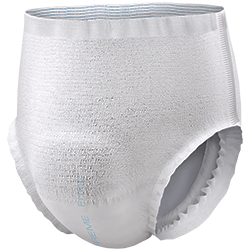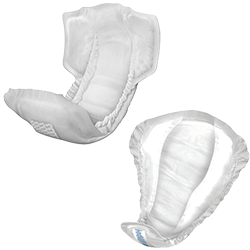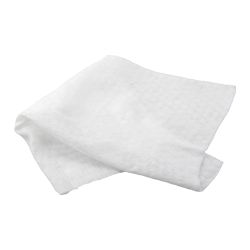A Guide to Opening Up About Incontinence

Understanding Incontinence
Incontinence is the inability to control the voiding of urine or feces, resulting in leaking that can impact a person's daily life. Depending on the type and its severity, people who experience fecal and urine leaks will often have to use supplies, such as adult absorbent products, and may have to plan activities around the leakage.
The most common type of incontinence is urinary incontinence. It is also the type of incontinence that can have many different underlying causes. Some types of urinary incontinence include:
-
Stress Incontinence - Urine leaks when pressure is exerted on the bladder by coughing, sneezing, laughing, exercising or lifting something heavy.
-
Urge Incontinence - A sudden urge to urinate with leakage.
-
Overflow Incontinence - Ocurs when the muscles of the bladder are not able to squeeze properly to empty the bladder and urine leakage occurs.
-
Functional Incontinence - When an individual with normal bladder and urethral function has difficulty getting to the toilet before urination occurs.
-
Mixed Incontinence - Typically a combination of stress and urge incontinence, with symptoms of both.
Some individuals with urinary incontinence also experience fecal incontinence. According to Mayo Clinic, fecal incontinence is the inability to control bowel movements, causing stool (feces) to leak unexpectedly from the rectum. Also called bowel incontinence, it ranges from an occasional leakage of stool while passing gas to a complete loss of bowel control. Common causes of fecal incontinence include diarrhea, constipation and muscle or nerve damage. The National Institutes of Health consider fecal incontinence a common problem. And, it is believed that anywhere from 10% to 36% of the U.S. population suffers from some form of bladder or bowel incontinence.
Whatever the cause, fecal incontinence can be embarrassing. But don't shy away from talking to your doctor about this common problem. Treatments can improve fecal incontinence and your quality of life.
Incontinence Can Impact Anyone
Incontinence does not discriminate by age, race or gender. As Cheryl Gartley, founder of The Simon Foundation for Continence says, "Incontinence is an equal opportunity employer." However, women are more likely than men to experience it, and the chance of experiencing incontinence is greater among the elderly. Despite this, incontinence is not inevitable for older women. It also cannot be assumed that just because a person is young and physically fit that they are not experiencing it.
Because it can be a sensitive subject for so many people, accurate numbers on the prevalence of incontinence can be difficult to obtain. It can therefore be assumed that any incontinence statistics collected are probably lower than reality. Taking that into account, with the numbers that are known, it is estimated that about 80 million Americans are experiencing incontinence today.
The Impact of Incontinence
Loss of bladder control is often more than a physical condition. In fact, the emotional impact can take more of a toll than physical issues. Studies have found a link between urinary incontinence and depression. Incontinence can leave people feeling a loss of control over the life they once knew and daily activities may need to be altered or stopped.
If someone experiences loss of bladder control, it is highly advised to seek the advice of a healthcare professional. The National Institute of Health advises, “Even if you feel embarrassed, it’s important that you discuss your urinary incontinence with a healthcare professional.” Read “Concerned About Bladder Leakage? Here are 6 Specialists You Need to Know About” for more information.
A doctor can use medical history and a physical exam to help determine the cause of bladder control issues and may order lab and other tests as well. Being prepared for the visit can help with diagnosis and treatment. Preparation may include keeping a bladder diary for a few days before the appointment, writing down symptoms and foods, beverages and activities that seem to be triggers, having a list of over-the-counter and prescription medications, the type of leakage (single, occasional, multiple voids) and anything else that may be helpful.
The Stigma of Urinary Incontinence
The experience of incontinence is unique to each person. Some people have been dealing with it for years while others have been newly diagnosed. Some people find it liberating to speak openly about their bladder concerns. Others are more comfortable keeping it secret. What is the right path for you?
The stigma surrounding incontinence can be one of the greatest contributors to the social isolation that comes with the condition. It is also one of the main reasons people are hesitant to share their experiences with others. There is a fear that once they reveal, according to the National Association for Continence (NAFC), they will never be looked at the same again. This stigma is also getting in the way of people receiving appropriate healthcare treatment and finding incontinence supplies that could make incontinence more manageable and life easier.
Incontinence Disclosure
To Tell or Not To Tell, developed by The Simon Foundation and an advisory panel, is a free and downloadable Toolkit designed for people who want to think more about disclosing their incontinence to others. It focuses on the decision of whether or not to tell friends, family, caregivers, bosses, co-workers and even strangers (for example when cutting into a bathroom line may help avoid an accident). There are many factors to consider in making the decision to tell or not to tell.
The program is not meant to pressure anyone to disclose or to discourage people from disclosing; rather it is meant to help guide individuals through the decision-making process. It will challenge any embarrassment individuals might be imposing on themselves and allow them to hear the stories of others whose lives have been impacted by urinary incontinence. Any decision, according to the Toolkit, should be an informed one and not one that comes from a place of shame or fear of stigma.
In addition to providing the toolkit for free, The Simon Foundation also offers small groups, guided by a trained Life Coach, to work through the Toolkit together from the privacy of their home by phone.
To Tell or Not to Tell Questions
The Simon Foundation suggests asking the following questions.
How will your choice to tell or not to tell:
-
Affect your relationships?
-
Affect your social interactions?
-
Affect your working environment?
Disclosing or concealing symptoms can be a complex and difficult decision. There is no right or wrong answer.
Each person has a different experience, as well as different levels of support. The question of whether or not to share this part of your life with others is a very personal and sometimes difficult one to answer. Luckily, communities such as The Simon Foundation with its To Tell or Not To Tell program have brought incontinence to light so that the conversation of whether or not to tell can happen.
For Many Managing Incontinence is the Key to a More Active Life
Although today there are many more treatments for incontinence available and medical specialists who are interested and knowledgeable in diagnosing and treating incontinence, some individuals may feel more in control by using absorbent products, according to Weill Cornell Medicine. There are a wide variety of incontinence supplies available today that are very discreet.
NorthShore Care Supply is the leader in high-absorbency tab-style briefs, protective underwear, pads, liners, male guards and more. Since 2002, NorthShore has helped millions of individuals across the U.S. find the right products and supplies for their needs, always delivered discreetly. We at NorthShore are committed to helping individuals live full lives by providing premium products and expert recommendations with compassion and understanding. And, NorthShore brand products are reassuringly strong with up to 3x the leak protection of leading store brands.












